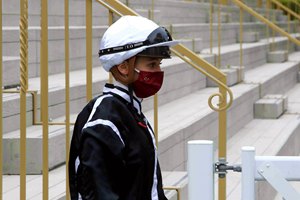BHA Requires Face Masks, Screening, Temperature Checks


Jockeys, trainers, and others in danger of breaching social distancing guidelines will have to wear face masks when racing resumes behind closed doors.
Admittance to the course on resumption will be strictly limited to those who need to be present, each of whom must pass several checks before being allowed in.
The requirements are set out in 33 pages of protocols issued by the British Horseracing Authority May 23 that must be followed by all those attending a meeting from racing's hoped-for resumption June 1 until further notice.
Social distancing officers will be appointed by the BHA to ensure all measures are implemented and strictly adhered to on race days.
The authority recognizes that activities such as legging a rider up or loading a horse into the stalls will involve being less than two meters apart, so it requires jockeys, trainers, valets, stable staff, and others to wear suitable face coverings, which will also be mandatory for anyone sharing their journey to the course with anyone from outside their own household.
To support trainers in the initial stages of resumption, the BHA has obtained a central supply of reusable, non-medical face coverings for use by stable staff on racecourses.
Access to the course will be limited to personnel essential for running a meeting. That does not include owners, but the BHA adds: "We wish to reassure owners of our aim to provide opportunities for them to attend race meetings at the earliest appropriate opportunity."
Everyone in attendance needs to have taken an online COVID-19 education module and completed an online medical declaration form within the previous seven days.
They must answer further questions on arrival, provide photo ID, and have their temperature taken twice using an infrared thermometer or other non-contact device. If the temperature exceeds 37.8 C on both occasions, access will be denied.
Those attending a meeting are warned to allow an additional 15-30 minutes to pass through the checkpoints.
Trainers are asked to assist with the smooth running of race days by avoiding sending any difficult or "fractious" horses—no companion animals or horses will be permitted entry—and to ensure all declared horses are well schooled in the stalls to minimize time taken to load and to help maintain social distancing.
The two-meter gap will be enforced by the use of taped areas, partitions, and increased supervision in the jockeys' changing rooms, and there will be no sauna or showers.
Saddles and other riding equipment must be disinfected on arrival, and jockeys need to take responsibility for maintaining social distancing on the way to and at the start.
In races, they are encouraged "to be especially mindful of continuing pressures on medical and health services, and to avoid taking unnecessary or avoidable risks, which may endanger themselves or others."
Only a limited number of people will be able to transfer between designated zones on course, and one-way systems will be in place where possible to limit the crossover of individuals.
Admission to the course will be possible only via designated entrance points—all others will be physically secured to prevent unauthorized access.
But there is no age restriction, as with Ireland's ban on the over-70s.
The BHA is being led by the government on that point, and there is no current guidance to prevent their attending.
